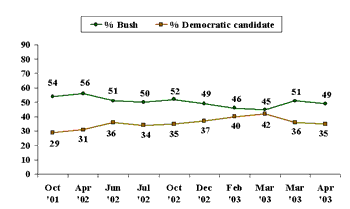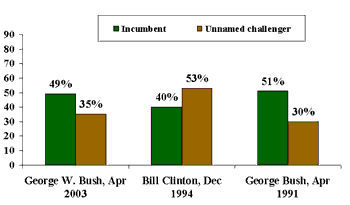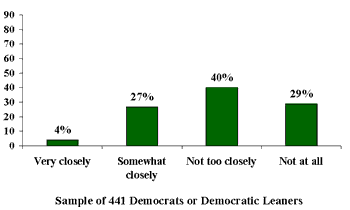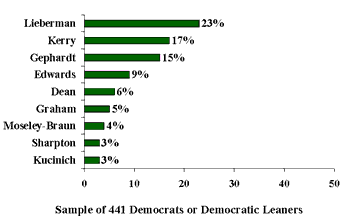GALLUP NEWS SERVICE
PRINCETON, NJ -- A new CNN/USA Today/Gallup Poll on the 2004 presidential election, based on a national survey conducted April 22-23, finds Connecticut Senator Joe Lieberman holding a slight edge over the field of nine Democratic candidates that will meet in South Carolina this weekend in the season's first nationally televised debate. Massachusetts Senator John Kerry and Missouri Congressman Dick Gephardt follow close behind. In March, Lieberman had tied Kerry for second place, with Gephardt in the lead.
The same poll shows George W. Bush in a relatively strong position against the Democrats in the general election, but without the sense of invincibility that surrounded his father after the 1991 Persian Gulf War.
Bush's Lead
George W. Bush holds a healthy advantage over an unnamed Democratic in the 2004 presidential election, after seeing that lead narrow to just 3 points earlier this year. Today 49% of national adults say they would vote for Bush, while 35% are inclined toward the Democratic Party's candidate.
Bush's 14-point lead today is similar to the 15-point lead he held in late March, but significantly better than his standing prior to the start of the Iraq war. In a March 14-15 poll, only 45% planned to vote for Bush versus 42% who were backing the Democrat. Bush is faring less well in the election than he did in the first several months after Sept. 11. At that time, he led an unnamed Democratic challenger by 25 points. But in the second half of 2002, his lead settled into the 15-point range, similar to where he stands today.
Bush's performance on this re-elect measure closely matches changes in his overall approval rating, which has varied from 90% in September 2001, to 57% last month, to 70% today.
| If George W. Bush runs for re-election in 2004, in general are you more likely to vote for Bush or for the Democratic Party's candidate for president? |
 |
Bush's current 14-point advantage -- taken 19 months before the 2004 election -- makes him appear to be a weaker candidate than his father at a comparable point in his presidency, but stronger than Bill Clinton. In April 1991, immediately following the Persian Gulf War, George Bush led an unnamed Democrat by 21 points, 51% to 30%. In December 1994, 23 months before the 1996 election, Bill Clinton trailed an unnamed Republican by 13 points, 40% vs. 53%. However, given Bush's loss in the 1992 election and Clinton's 1996 victory, these trends serve as an important check on the stock put into such early readings.
| Early Presidential Test Elections |
 |
Perhaps the American public is aware of this history, particularly the fate of Bush I. Despite Bush II's current lead over the Democrats in the race for president, and his extremely strong approval rating (70%), the public by no means considers him a shoo-in. As many Americans believe the Democratic candidate can win the 2004 election (46%) as think Bush is certain to win (46%). By contrast, in October 1991, two-thirds of Americans (66%) thought Bush I could not be defeated.
Naturally, Republicans are widely optimistic about the current Bush's chances for re-election, while most Democrats hold out hope that he can be unseated. But rather than falling halfway between the Republicans and Democrats as they often do, by a 50% to 39% margin, political independents are inclined to think the Democrats have a chance in 2004.
Right now, do you think George W. Bush will definitely be re-elected President in 2004, or do you think a Democratic candidate can win the election?
|
Republicans |
Independents |
Democrats |
|
|
Bush will definitely win |
74 |
39 |
23 |
|
Democrat can win |
20 |
50 |
70 |
|
No opinion |
6 |
11 |
7 |
Democratic Race Running Below Public's Radar Screen
One reason why test elections this early in the campaign may be unreliable predictors of the ultimate result is that most Americans have yet to pay close attention to the opposing candidates. Less than one-third of Democrats and Democrat-leaning independents report paying close attention to the news about the candidates running for the Democratic nomination. Nearly as many admit to be paying no attention, while another 40% are paying minimal attention.
| How closely have you been following the news about the candidates running for the Democratic nomination for president -- very closely, somewhat closely, not too closely, or not at all? |
 |
When asked whom they are most likely to support for the Democratic presidential nomination, this group of relatively inattentive Democrats and Democratic leaners gives a slight edge to Lieberman. Twenty-three percent favor Lieberman, compared with 17% who back Kerry, and 15% for Gephardt. North Carolina Senator John Edwards garners 9% of the vote, followed by Vermont Governor Howard Dean with 6%, and Florida Senator Bob Graham with 5%.
Three candidates receive support from fewer than 5% of Democrats: former Illinois Senator Carol Moseley Braun, Reverend Al Sharpton from New York, and Ohio Representative Dennis Kucinich.
| Democratic Preference for 2004 Democratic Nomination |
 |
Among those who are paying close attention to the campaign (saying they follow the news about the candidates very or somewhat closely), Kerry edges out Lieberman by a small margin, 22% to 19%. This could be a signal of the hidden strength John Kerry has within the active ranks of the Democratic Party -- people who can be relied on to turn out in primaries.
|
Democratic Preference by Attention to the Campaign |
||
|
Following campaign closely |
Not following campaign closely |
|
|
% |
% |
|
|
Joe Lieberman |
19 |
25 |
|
John Kerry |
22 |
14 |
|
Dick Gephardt |
14 |
15 |
|
John Edwards |
13 |
7 |
|
Howard Dean |
9 |
5 |
Other notable findings evident in voter support for the Democratic candidates:
- Democratic men and women are similar in their candidate preferences.
- Lieberman runs stronger with younger generations than with those over fifty years of age. He is the clear frontrunner with those aged 18-49, but falls behind Kerry and Gephardt among those 50 and older.
|
Democratic Candidate Preference by Age
|
||
|
18-49 |
50+ |
|
|
Joe Lieberman |
25% |
19 |
|
John Kerry |
12% |
23 |
|
Dick Gephardt |
11% |
20 |
|
John Edwards |
9% |
9 |
- Lieberman leads in the eastern and western regions of the country, and ties for first with Edwards in the South.
- Gephardt leads in his geographic base, the Midwest.
- Gephardt receives his greatest support from self identified "conservative" Democrats. Kerry and Lieberman have more broad-based ideological appeal.
|
Democratic Candidate Preference by Political Ideology
|
|||
|
Conservative |
Moderate |
Liberal |
|
|
Joe Lieberman |
23% |
26 |
19 |
|
John Kerry |
16% |
15 |
20 |
|
Dick Gephardt |
22% |
14 |
9 |
|
John Edwards |
9% |
10 |
8 |
Lieberman Gains Ground Since April
The current results on the Democratic nomination represent a slight change from last month, when Gephardt had led the field. Between mid-March and late April, support for Lieberman rose from 16% to 23%. Over the same period, Gephardt's support declined slightly from 19% to 15%.
It should be noted that most of the interviews for the latest survey were conducted before April 23, when Gephardt unveiled a major health-care reform proposal, which he says will be the centerpiece of his campaign for president. That plan has subsequently been the target of much political commentary, and could conceivably have altered support for Gephardt and the rest of the Democratic field.
Survey Methods
These results are based on telephone interviews with a randomly selected national sample of 1,001 adults, 18 years and older, conducted Apr. 22-23, 2003. For results based on this sample, one can say with 95 percent confidence that the maximum error attributable to sampling and other random effects is plus or minus 3 percentage points. In addition to sampling error, question wording and practical difficulties in conducting surveys can introduce error or bias into the findings of public opinion polls.
If George W. Bush runs for re-election in 2004, in general are you more likely to vote for Bush or for the Democratic Party's candidate for president?
|
|
Democratic candidate |
OTHER |
No |
|
|
% |
% |
% |
% |
|
|
George W. Bush |
||||
|
National Adults |
||||
|
(NA) 2003 Apr 22-23 |
49 |
35 |
3 |
13 |
|
(NA) 2003 Mar 29-30 |
51 |
36 |
4 |
9 |
|
(NA) 2003 Mar 14-15 |
45 |
42 |
5 |
8 |
|
(NA) 2003 Feb 24-26 |
46 |
40 |
4 |
10 |
|
(NA) 2002 Dec 16-17 |
49 |
37 |
4 |
10 |
|
(NA) 2002 Oct 3-6 |
52 |
35 |
2 |
11 |
|
(NA) 2002 Jul 29-31 |
50 |
34 |
3 |
13 |
|
(NA) 2002 Jun 21-23 |
51 |
36 |
3 |
10 |
|
(NA) 2002 Apr 29-May 1 |
56 |
31 |
3 |
10 |
|
(NA) 2001 Oct 5-6 |
54 |
29 |
2 |
15 |
|
Registered Voters |
||||
|
(RV) 2003 Apr 22-23 |
49 |
36 |
3 |
12 |
|
(RV) 2003 Mar 29-30 |
51 |
36 |
4 |
9 |
|
(RV) 2003 Mar 14-15 |
45 |
42 |
5 |
8 |
|
(RV) 2003 Feb 24-26 |
47 |
39 |
4 |
10 |
|
(RV) 2002 Dec 16-17 |
51 |
37 |
3 |
9 |
|
(RV) 2002 Oct 3-6 |
54 |
35 |
1 |
10 |
|
(RV) 2002 Jul 29-31 |
51 |
34 |
3 |
12 |
|
(RV) 2002 Jun 21-23 |
51 |
37 |
3 |
9 |
|
(RV) 2002 Apr 29-May 1 |
56 |
32 |
3 |
9 |
|
(RV) 2001 Oct 5-6 |
56 |
29 |
2 |
13 |
|
George H.W. Bush |
||||
|
(NA) 1992 Jan 31-Feb 2 |
46 |
38 |
-- |
16 |
|
(NA) 1992 Jan 3-9 |
42 |
41 |
-- |
17 |
|
(NA) 1991 Dec 5-8 |
48 |
34 |
-- |
18 |
|
(NA) 1991 Nov 21-24 |
48 |
36 |
-- |
16 |
|
(NA) 1991 Oct 31-Nov 3 |
46 |
36 |
-- |
18 |
|
(NA) 1991 Oct 10-13 |
49 |
32 |
-- |
19 |
|
(NA) 1991 Sep 13-15 |
51 |
29 |
-- |
20 |
|
(NA) 1991 Sep 5-8 |
52 |
29 |
-- |
19 |
|
(NA) 1991 Aug 23-25 |
55 |
27 |
-- |
18 |
|
(NA) 1991 Jun 13-16 |
51 |
30 |
-- |
19 |
|
(NA) 1991 Apr 25-28 |
51 |
30 |
-- |
19 |
|
(NA) 1991 Mar 7-10 |
67 |
17 |
-- |
16 |
|
(NA) 1991 Feb 14-17 |
54 |
33 |
-- |
13 |
|
1991-1992 WORDING: If George Bush runs for re-election in 1992, in general are you more likely to vote for Bush or for the Democratic Party's candidate for president? |
||||
Right now, do you think George W. Bush will definitely be re-elected president in 2004, or do you think a Democratic candidate can win the election?
|
Will definitely |
Democratic candidate can win |
No |
|
|
2003 Apr 22-23 |
46% |
46 |
8 |
Trends for Comparison:
Right now, do you think George Bush will definitely be re-elected president in 1992, or do you think a Democratic candidate can win the election? (Source: CBS/New York Times Poll)
|
Will definitely |
Democratic candidate can win |
No |
|
|
1991 Nov 18-22 |
47% |
42 |
11 |
|
1991 Oct 15-18 |
66% |
26 |
8 |
Next, I'm going to read a list of people who may be running in the Democratic primary for president in the next election. After I read all the names, please tell me which of those candidates you would be most likely to support for the Democratic nomination for president in the year 2004. [ROTATED:Massachusetts Senator, John Kerry, Connecticut Senator, Joe Lieberman, North Carolina Senator, John Edwards, Missouri Congressman, Dick Gephardt, Florida Senator, Bob Graham, Vermont Governor, Howard Dean, the Reverend Al Sharpton, Ohio Congressman, Dennis Kucinich, Former Illinois Senator, Carol Moseley Braun]
BASED ON --441 -- DEMOCRATS OR DEMOCRATIC LEANERS
BASED ON -- 386 -- DEMOCRATS OR DEMOCRATIC LEANERS WHO ARE REGISTERED TO VOTE
|
2003 Apr 22-23 |
2003 Mar 14-15 |
|||
|
National |
Registered Voters |
National |
Registered Voters |
|
|
% |
% |
% |
% |
|
|
Joe Lieberman |
23 |
22 |
16 |
15 |
|
John Kerry |
17 |
18 |
16 |
16 |
|
Dick Gephardt |
15 |
16 |
19 |
20 |
|
John Edwards |
9 |
8 |
7 |
6 |
|
Howard Dean |
6 |
6 |
5 |
5 |
|
Bob Graham |
5 |
5 |
4 |
4 |
|
Carol Moseley Braun |
4 |
4 |
7 |
8 |
|
Al Sharpton |
3 |
3 |
6 |
5 |
|
Dennis Kucinich |
3 |
3 |
3 |
3 |
|
Other |
1 |
1 |
1 |
1 |
|
No One |
5 |
5 |
3 |
3 |
|
No Opinion |
9 |
9 |
13 |
14 |
How closely have you been following the news about the candidates running for the Democratic nomination for president --very closely, somewhat closely, not too closely, or not at all?
BASED ON -- 441 -- DEMOCRATS OR DEMOCRATIC LEANERS
|
Very |
Somewhat closely |
Not too closely |
|
No |
|
|
2003 Apr 22-23 |
4% |
27 |
40 |
29 |
-- |
(vol.) – Volunteered response